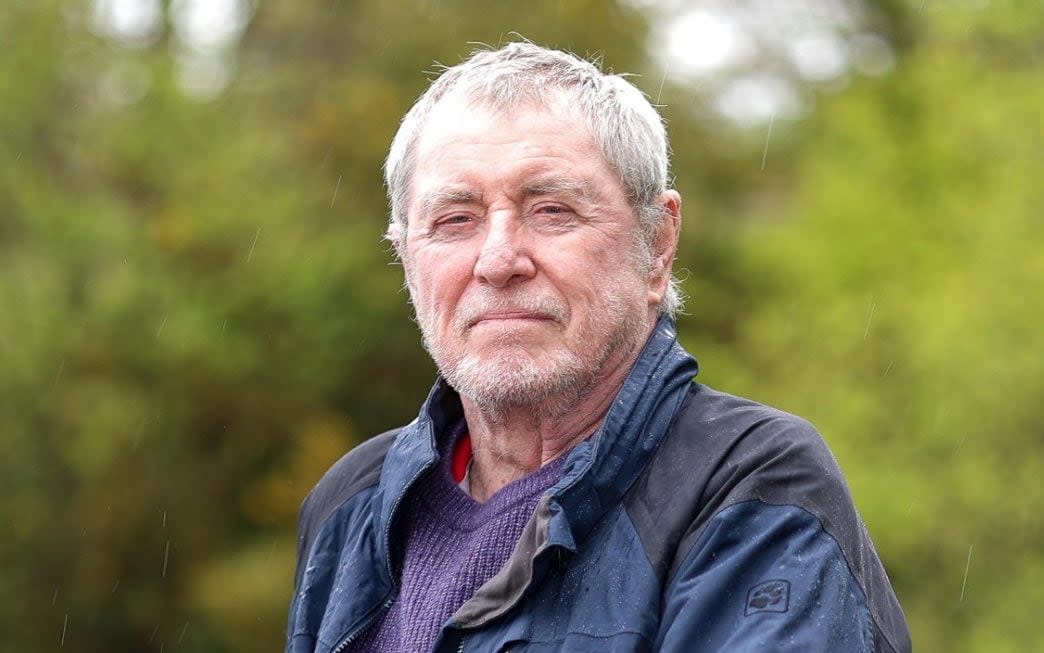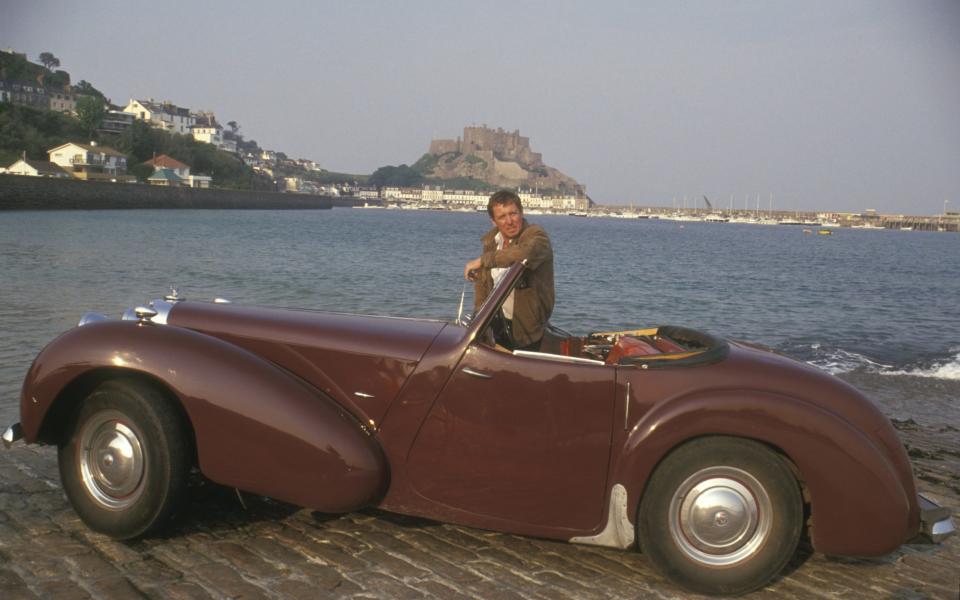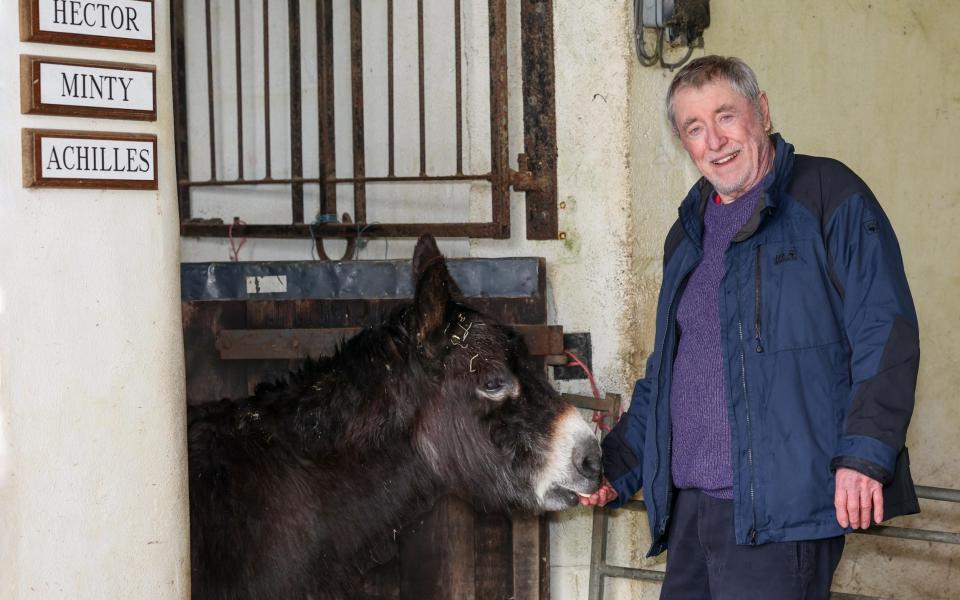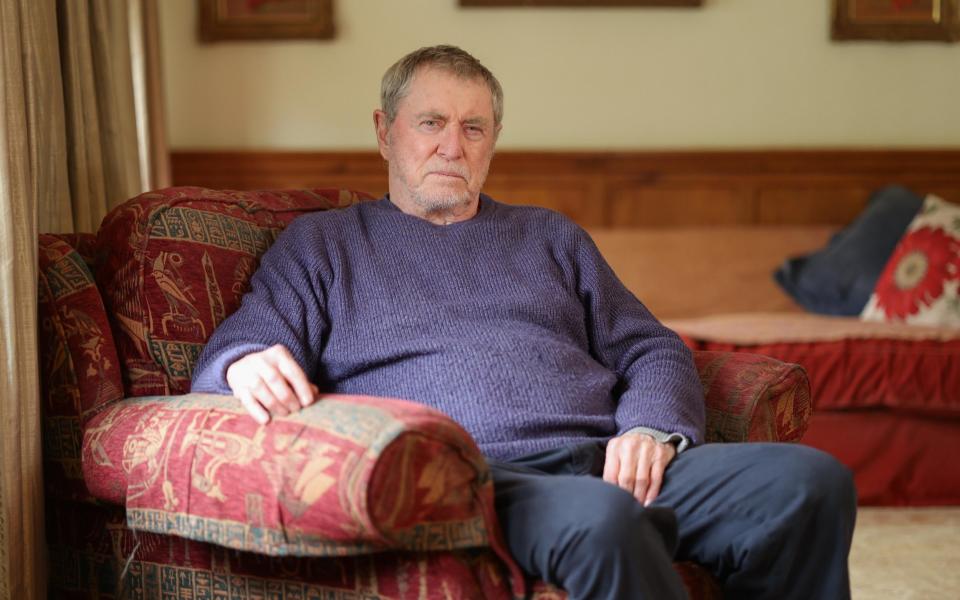John Nettles interview: ‘Actors were on Bergerac for their talent – it wasn’t about inclusivity’

John Nettles picks me up from Exeter St David’s station in a weary looking mud-splattered Rover. Alas, the claret-coloured open topped 1949 Triumph Roadster, synonymous with Nettles’ career-defining detective Jim Bergerac from the eponymous Eighties hit BBC series, is nowhere to be seen. “That old thing had become so battered, mushrooms had started growing inside it,” he says. “When the late Queen Elizabeth and Prince Phillip visited us on set on Jersey, we had to cover the back seats with a blanket so the ripped leather wouldn’t show.”
The Triumph’s days of roaming the open Jersey highways, Nettles at the wheel, a gorgeous woman invariably beside him, hair flapping in the wind, may be long gone. But a new car might soon be taking its place: a reboot of the original series, which during its heyday regularly attracted 15 million viewers, is in the works, written by Doctor Who’s Toby Whithouse and with filming due to begin on Jersey this summer.
“Just like his predecessor, our Bergerac [will be] complex, driven, brilliant and flawed,” Whithouse has said, while Poldark actor Aidan Turner, Doctor Who star David Tennant and Happy Valley’s James Norton have been rumoured to be in the frame for the title role.
Has Nettles, who is now 80, been approached himself for a cameo? “I’m rather miffed they haven’t been in touch at all! Although I can’t see how a reboot will work. The show belonged to Thatcherite Britain, to a time of fast money and beautiful girls.” Who would he choose to play Bergerac, the dashing, crumpled, ex-alcoholic cop who across the decade-long series despatched a staggering number of villains almost single handed, his facial expressions rarely extending beyond a terse grimace or, if a female was in close proximity, a fleeting twinkle? “I have no idea. To be honest, I can’t imagine anyone playing him but me.”
We are sitting in the front room of Nettles’ house – a 15th-century Devon longhouse with a sensitive modern extension, buried deep in the pillowy Devon countryside, where Nettles has lived with his second wife, Cathy, a painter now in her 70s, for 14 years. The décor is tasteful – a mix of farmhouse cottage blended with low-key Elizabethan grandeur, the sound of barking (he has three rescue dogs) behind a closed door.

He’s jolly good company, spilling anecdotes about the many actors he has worked with across a 40-year career and bewailing the current state of BBC Radio 3. (“Can you tell me what on earth is going on? There’s a recent celebrity hire who knows nothing at all about the pieces he plays.”)
His proprietary attitude to Bergerac is understandable. He is, of course, almost as well known for playing DCI Tom Barnaby in Midsomer Murders for 14 years (he retired the character in 2011; Neil Dudgeon now leads the series as Barnaby’s DCI cousin, John). But it was Bergerac that turned him from a respectable but little-known screen and stage actor to housewife heartthrob almost overnight when the first episode aired in 1981.
“The decent obscurity of classical theatre is to be admired, of course, but I wasn’t so much an artiste as to not enjoy my new-found fame,” he says, his voice bearing fruity traces of the five years he spent after Bergerac with the RSC. With the fame came countless letters from women all over the world, offering various services of a sexual nature and, in one instance, a pair of knickers. He still gets fan mail to this day. “I was flattered, of course I was. But I didn’t take it seriously. You can’t start to believe your own publicity.”
Bergerac himself was famously a ladies’ man: in the very first episode he even makes a play for his dead colleague’s fiancée. What does Nettles think of his attitude to women now? “Awful. Terrible, terrible. I was channelling my younger self, I think. I was a child of the 1960s. An infantile sexuality characterised all that time. The attitudes towards women were appalling throughout the 1950s and Sixties.
“And then you had the grimy grubby grotty film industry in the 1970s, churning out films like Adventures of a Plumber’s Mate, that sort of thing. It damaged a lot of people. I was some kind of victim myself: bits and pieces of that attitude, a simplistic view of womankind, remained with me for far too long, as it did with many people of that generation. Luckily I met many women who taught me otherwise.”
He married his first wife, Joyce Middleton, who became a casting director on Midsomer Murders, in 1996 and with whom he has a daughter, Emma (his only child) who joined the Jersey police force while Nettles was living there – he had a house on the island throughout filming. “I pretty much went native,” he says. “You take on this island mentality: you start to think Jersey is the centre of the universe. Even now when I visit, it’s like having a warm blanket thrown over you; there is such a lovely, homely feeling about the place. When I came back to the mainland at the start of the 1990s, I felt very out of the loop.” His marriage to Middleton had ended in 1979; after his return to Britain he married Cathy in 1995.
Yet he also defends the series. “We had Celia Imrie, Louise Jameson, Deborah Grant [who played Bergerac’s icy ex wife] – none of them is your idea of a stereotypical decorative female.” Nor indeed, Floella Benjamin, who had a prominent role in the first episode. “Race was never about tokenism back then. Actors were cast because they were talented and right for the part, which is the only reason to cast anyone. It was never part of an argument about inclusivity or social engineering. That only cropped up much later with Midsomer Murders.”

Ah yes, the delightfully absurd evergreen whodunnit caper that spins a knowingly escapist fantasy of bucolic rural England and which this year celebrates its 25th anniversary. In 2011, while Nettles was still with the show, the then producer Brian True-May was suspended by the BBC for saying Midsomer was “the last bastion of Englishness” and “it wouldn’t work” if racial diversity within the cast was increased (True-May stepped down permanently in 2013). “Brian expressed himself very badly. But his point was that the show’s dramatic conceit is based on an old fashioned 1950s-style community. He was unduly vilified for that.”
He tells me the late Queen was a great fan of Midsomer. “I met her again at some ITV bash, we talked a bit about the script and I apologised for the fact the show had bumped off so many of her subjects. She said, ‘I wouldn’t like to live in Midsomer’. And one of her equerries said, ‘no Ma’am. You’d be dead’. Apparently she and Margaret used to argue over how to pronounce Midsomer. Might the emphasis be on the mid, or the som?”
He also met Prince Charles in Stratford during the early 1990s. “Oh yes, he was a great supporter of the RSC. We would all line up after a particular performance and be introduced to him. He’d always have something wise and wonderful to say. I remember one instance, it was the time of Diana, all that trouble, and we’d just performed The Winter’s Tale. He said to me, ‘I keep a quote from that play in my pocket.’ And he retrieved a piece of paper and recited: ‘There’s some ill planet reigns/I must be patient till the heavens look’. I just love the man. He’s extraordinary.”
Nettles was born in St Austell in 1943 to an Irish nurse and adopted at birth by Eric Nettles, a carpenter, and his wife Elsie, who took whatever job she could get. He describes his childhood in Cornwall as “exquisitely poor”.
“The overriding concern for my lovely adoptive parents every minute of the day was about where the next penny was coming from. I would often find my father sat in front of the Rayburn in our council house smoking endless cigarettes because a job had fallen through. And I remember once my mother crying after being sacked from a hotel because she had tried to cover the holes in her shoes with Blanco stickers. There was no idea of enjoying theatre or music back then: the greatest and overriding ambition was to make money. The means wasn’t important. It affected me dreadfully. And I think to some extent that kind of materialism has always remained with me.”
He doesn’t come across as flash, I suggest. “I mean that for quite a long time I measured my success in terms of how much money I was making. Also, I was an only child, which meant that all the wishes and ambitions of your parents are on your shoulders. So you start to show off. It makes you self conscious in a destructive kind of way and, if I’m absolutely honest, a bit narcissistic.”
Acting was never initially part of the game plan. In 1962 he went to Southampton University where he studied history and philosophy. “It was like the doors had opened and I could see beyond this marvellous world of words and ideas, this great new beginning,” he says. But then he appeared in a student amateur show. “And an agent came up and said, ‘Can I be your agent?’ And I said, ‘That would be nice’.” And that was that.”

He began working at the Royal Court on graduating in the mid-Sixties, and in 1969 played Laertes opposite Tom Courtney’s Hamlet in Manchester. “I was one of those 1960s working-class actors who burst in through the French windows wearing our truculence like badges. Gone was the gentleman era of actors like Kenny Moore and David Niven. Anger was all we had. And our youth.” He talks with particular fondness of his time some years later with the RSC, where he stayed for five seasons during the 1990s.
Yet few now remember this part of his CV. Somewhere in Nettles, not so far below the surface, is a half-decent Shakespearean actor who mourns the great classical career he might have had – he quotes Shakespeare liberally and beautifully. But he is also a realist, or perhaps more accurately, a pragmatist.
“I could see other actors doing what I wanted to do much better than I could. Peter Hall once asked me to do Falstaff at Bath but Roger Allam had just played him at the Globe [in 2010], so I thought: ‘There is no point touching that part now for another 10 years.’ It’s an undue modesty but it’s also true.”
He’s at peace with the fact he is known for only two roles. “I was about to sign up for series five of Midsomer when an actor friend said to me: ‘That’s it. If you say yes to this, it’s the end. This is you now.’ He was right. And I still made the decision to go on. Because it was a very nice life, thank you very much. To be honest, by that point, I couldn’t imagine doing anything else.”
What has he learned about policing in his 25 years of playing a cop? Did he ever talk to real detectives for advice? “I know most of the force on Jersey because most of them appeared in Bergerac. At one point during filming someone backed a Ford Fiesta through the window of a jewellers in St Helena and the police were nowhere to be found because they were all at the airport being extras.
“But the main thing I learnt was that the real stuff is much harder than it is portrayed on TV. I met several homicide detectives over the years, and the impact of dealing with that level of violence on a person can be hard to take. It’s a bit of a leap to dress it up as entertainment on TV. Although the murders in Midsomer aren’t real murders – they are more like crossword clues.” He doesn’t watch many crime shows himself.
“People are so jaded with the genre now that nothing but killing will do. And you’ve got to keep topping the graphic criminality until it becomes grotesque. So I don’t watch it. You don’t need violence to make a point.”

He was shocked by the 2023 Baroness Casey report that revealed the Met police to be institutionally racist, sexist and homophobic, following the murder of Sarah Everard by a serving police officer in 2021. “Shocked, but not surprised. There have always been rotten policemen, it’s like any other organisation. Although you can’t help but ask questions about the vetting procedure that allows such people to be members of the police – that’s difficult to come to terms with.”
These days Nettles spends his time as an amateur historian. He made a three-part documentary about the Nazi occupation of the Channel Islands, published a book, Jewels and Jackboots, on the same subject, and in 2019 published an edition of the diaries of Reverend Douglas Ord who lived on Guernsey during the Second World War.
He’s currently working on a translated version of diaries of Baron von Aufsess who was Chief of Administration during the Occupation at the Feldkommandantur, Jersey, and which will be published in September. “He has this fascinating German mentality that explains why the Germans carried on fighting even when it was clear they were losing the war. The attitude was very much, ‘my country, right or wrong’. He sympathises with the island inhabitants, forced to cooperate with their occupiers. Their argument was: ‘They’ve got the gun. We haven’t.’
“Jersey is a very small place, only about seven miles wide, and there were 30,000 Germans there. There was nowhere to hide.”
He’s not particularly surprised by the recent increase in antisemitism across Britain. “It’s always been there. People go with the tide. But particularly with the Jews. It’s always been terrible. They have always been the group people like to blame.”
The other major passion of his life is horses. He and his wife have three rescue horses and two donkeys. “I sometimes think God made horses on the Monday, when everything was fresh. They are the most beautiful creatures.”
He was captivated by the story last week of the five runaway cavalry horses who had become spooked by some building work and broke loose across London. “Thank goodness the injured horses are going to be all right. But the response was so fantastically British! No one gave a toss about the taxi driver or the smashed up Mercedes. It was all, ‘What about the horses?’ And how lovely that is too. I wouldn’t have it any other way.”
A committed environmentalist, he was recently involved in a failed campaign to prevent a vast new solar farm being built on land surrounding his home village of Pyworthy. “There are already three solar farms here of between 30-40 acres each, and far as I’m concerned this is us doing our bit. This one is going to be 150-plus acres. But we lost, because the land on which it will be built is of poor agricultural quality. I’m not against solar panels as such, but you can have too much of a good thing.”
With his daughter Emma, who now has two children, still living in Jersey – she has also worked as a data protection officer and is currently heading the Scottish Government inquiry into the use of mobile messaging apps during the pandemic – he goes back to the island as much as he can.
He is rather proud that the States Assembly on Jersey is currently engaged in a public consultation on the issue of assisted dying. “Usually the islands are at least 10 years behind the mainlands as far as legislation of that kind is concerned. When it comes to issues like homosexuality, for instance, they can be rather old fashioned. So I’m rather proud, since I still feel affiliated to them, that these little islands should be debating these huge complicated arguments. I’m definitely with Esther Rantzen on this one. There are some forms of pain and dementia that simply defeat life.”
Looking fit and well he is certainly busy. He is, however, very much retired. “Old actors tend to describe themselves as semi-retired. What that means is, no one is offering you any work. I’ve cut through that – I’m retired.” Even if Bergerac comes calling? “Absolutely!” But you know what? Such is the affection he still demonstrably holds for the part, and the affection in which the original series is still held, I wouldn’t rule it out.

 Yahoo News
Yahoo News 
